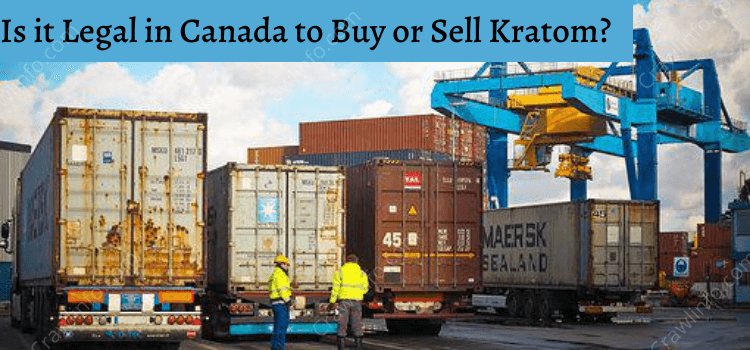If you’re a Kratom user, you’re probably aware of how it helps with pain and anxiety. However, the regulations governing Kratom vary from country to country. Each country takes a different stance on this plant; some have outright outlawed it, while others have limited its use.

Kratom is legal in Canada, although it is a controlled substance under the Narcotic Control Act. If you are one of the Kratom importers or users in Canada, you should understand how this may affect you. This blog post will tell you everything you need to know about the legality of Kratom in Canada and how to import Kratom into the nation lawfully.
What is Kratom?
Kratom is the name of a coffee-family tree native to Southeast Asia. In Thailand, Malaysia, and Indonesia, it is known as Mitragyna speciosa. Its dried leaves are either used to make tea or encapsulated and sold as a dietary supplement. Kratom leaves can be smoked similarly to tobacco.
Mitragynine and 7-hydroxy mitragynine, two critical dynamic combinations in Kratom, act on narcotic receptors but have fewer adverse effects. People use it to treat pain, depression, and drug addiction. You can find powder and capsules at various health food stores, vape shops, and specialized internet vendors.
Things to Know About The Legal Status Of Kratom In Canada?
As previously stated, Kratom is lawful in Canada under the Narcotic Control Act. However, there is a significant distinction between legal and controlled. While the rule establishes that Kratom is legal in Canada, the Controlled Drugs and Substances Act classifies it as a controlled substance.
Kratom’s legal position is comparable to marijuana or cocaine, where restricted possession, cultivation, and distribution are restricted. The federal government of Canada has classified Kratom as a Schedule 1 substance under the Controlled Drug and Substances Act.
Kratom is addictive and damaging to one’s health. It is the strictest category for medications with a strong potential for abuse but no medical value. According to the Controlled Drugs and Substances Act, you can only bring Kratom into Canada.
How To Import Kratom Into Canada?
According to the Narcotic Control Act, Kratom can be possessed and sold in Canada. However, we classify it as a controlled substance under the Controlled Drugs and Substances Act. It means that you can only bring Kratom into Canada if you want to utilize it for personal purposes.
You cannot import it to resell or use in your business. The Canada Border Services Agency (CBSA) allows you to bring in a maximum of three months’ worth of Kratom. Kratom can only be imported if it is not in gel caps or another capsule form.
Kratom powder and leaves are the only legal forms of this substance. You do not need to provide any particular documents at the border if you import Kratom for personal use. However, it must be less than three months’ supply of Kratom and not in capsule form. The Narcotic Control Act allows you to import 30 grams of Kratom for personal use. If you are importing Kratom for commercial purposes, you must have the necessary papers.
Can You Ship Kratom Around Canada?
Yes, you can, in a nutshell. Canadian kratom dealers can now easily transport their items within Canada’s borders. There are no provinces in Canada that have banned the use of Kratom, in contrast to the United States, where some states have rigorously forbidden the import and export of Kratom.
An essential factor is to ensure that the products are appropriately labeled. Kratom dealers must be careful to label their items as ‘not for human use’ to avoid any problems during the shipping procedure. As long as we follow that aspect, Canadian buyers can anticipate their products within 24 hours of making an order.
Is it Legal in Canada to Buy or Sell Kratom?
Yes, it is legal, although there are certain restrictions. Remember that you should never advertise your kratom product as a food, drink, or health supplement. If a vendor fails to meet these requirements, Health Canada and the Canadian Food Inspection Agency (CFIA) have the authority to seize the products and close your operation.
Suppose you sell Kratom and ship it outside of the country. In that case, the regulations that govern Kratom in that jurisdiction will determine whether the package arrives at the customer’s doorstep or is intercepted along the way. You will face no legal consequences if the laws seize it because you export from a country that does not prohibit the herb.
Conclusion
Because Kratom is not yet for human consumption, the Canadian government demands that your products be labeled appropriately. However, Canada appears to be more sympathetic to Kratom strains for pain being a helpful herb; we may soon see these restrictions abolished.






Leave a Reply